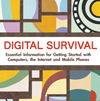- The Computer
- The Internet
- The Mobile Phone
Tip: Passwords
1. Pick one really easy password and use it only for nuisance logins - those sites where you know you won't really care if someone gets hold of your account. Yes, someone could steal your password - but what are they going to do with it? If you’re worried about protecting your privacy, use a better password, but if you aren't, use the same plain word over and over again and don't think twice about it. Good examples of nuisance logins are:
- Newspapers and other online content
- Travel sites or airline sites
- Email lists, online communities and photo sharing site
2. Pick one password for private things that aren't life or death. Find a random password or invent a semi-random password. Passwords you should be able to keep to yourself:
- Your email account(s)
- The FTP login for your website
3. You might need a few passwords you can share – these should change at least as often as staff changes. They should be random passwords, but they shouldn't be the same as any password you use for personal logins. Server passwords and shared websites often fall into the shared category.
4. Your last password category is for really sensitive stuff. Ideally, you wouldn't reuse these passwords, but more importantly, this should be a truly random password, and you should change it from time to time. For example:
- A web-based membership database
- Remote access to your desktop computer
- Banking websites or anywhere your information is stored
Passwords are strongest when they have a combination of letters, numbers and symbols. Easy-to-remember passwords can be made stronger by incorporating numbers in place of letters, for instance: “f@6u1ou5”
For more on password-protecting your computer please see: http://security.tacticaltech.org/chapter_3_1

